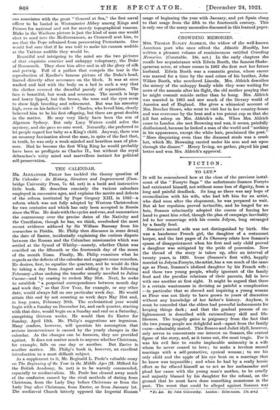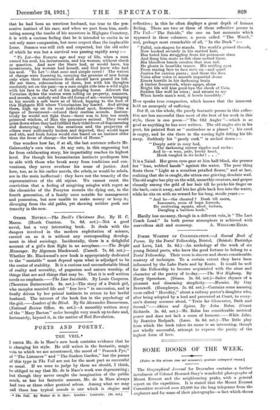FICTION.
TO LET.•
IT will be remembered how at the close of the previous instal- ment of the " Forsyte Saga " the unfortunate Soames Forsyte had extricated himself, not without some loss of dignity, from a long and painful deadlock. So long as there was any hope of reconciliation with his wife, who had left him for an artist,' who died soon after the elopement, he was prepared to wait. But as her repulsion proved invincible, and he longed for an heir, Soames reluctantly adopted the course of forcing her hand to grant him relief, though the plan of campaign inevitably led to her remarriage with his cousin Jolyon, long estranged by a family feud.
Soames's second wife was not distinguished by birth. She was a handsome French girl, the daughter of a restaurant keeper, and the last pages of In Chancery relate how Soames's spasm of disappointment when his first and only child proved a daughter was mitigated by the pride of possession. Now the thread of the story is taken up, after an interval of twenty years, in 1920. Irene (Soames's first wife), happily married to Jolyon Forsyte, the artist, has a son much of the same age as Fleur, Soames's idolized daughter by his French wife ; and these two young people, wholly ignorant of the family feud and the peculiar relations of their parents, fall in love with one another at first sight. It might be argued that there is a certain wantonness in devising so painful a complication —in particular that so shrewd and inquiring a young woman as Fleur was not likely to have grown to years of discretion without any knowledge of her father's history. Anyhow, it must be conceded that the elders had powerful inducements for keeping things dark ; and that the gradual process of en- lightenment is described with extraordinary skill and life- likeness. The tragedy gains in poignancy from the fact that the two young people are delightful and—apart from the family curse—admirably mated. This Romeo and Juliet idyll, however, only serves to concentrate our interest on Soames, the central figure of the story, and, as it turns out, the most tragic. For it was his evil fate to excite implacable animosity in a wife whom he never ceased to love ; to make a loveless second marriage with a self-protective, cynical woman ; to see his only child and the apple of his eye bent on a marriage that he knew was impossible ; and when he had by a really heroic effort so far effaced himself as to act as her ambassador and plead her cause with the young man's mother, to be cruelly and unjustly blamed by his daughter for the refusal, on tho ground that he must have done something monstrous in the past. The worst that could be alleged against Soames was • To Let. By John GaLsworthy. London : Heinemann. [U. neLl
that he had been an uxorious husband, too true to the pos- sessive instinct of his race, and when we part from him, medi- tating among the tombs of his ancestors in Highgate Cemetery, it is with a curious feeling that he is intended to excite in us not only more compassion, but more respect than the implacable Irene. Soames was still rich and respected, but the old order of which he was but a survival was passing rapidly away :-
" To Let—the Forsyte age and way of life, when a man owned his soul, his investments, and his woman, without check or question. And now the State had, or would have, his investments, his woman had herself, and God knew who had his soul. ' To Let '—that sane and simple creed ! The waters of change were foaming in, carrying the promise of new forms only when their destructive flood should have passed its full. He sat there, subconscious of them, but with his thoughts resolutely set on the past—as a man might ride into a wild night with his face to the tail of his galloping horse. Athwart the Victorian dykes the waters were rolling on property, manners, and morals, on melody and the old forms of art—waters bringing to his mouth a salt taste as of blood, lapping to the foot of this Highgate Hill where Victorianism lay buried. And sitting there, high up on its most individual spot, Soames like a figure of Investment—refused their restless sounds. Instinc- tively he would not fight them—there was in him too much primeval wisdom, of Man the possessive animal. They would quiet down when they had fulfilled their tidal fever of dispossessing and destroying ; when the creations and the properties of others were sufficiently broken and dejected, they would lapse and ebb, and fresh forms would rise based on an instinct older than the fever of change—the instinct of Home."
One wonders how far, if at all, the last sentence reflects Mr. Galsworthy's own views. At any rate, in this engrossing but far from exhilarating story, his impartiality reaches its highest leveL For though his humanitarian instincts predispose him to side with those who break away from traditions and con- ventions, they never overbear his sense of justice. And here, too, as in his earlier novels, the rebels, or would-be rebels, are in the main ineffectual : they have not the tenacity of the representatives of the old regime. We cannot resist the conviction that a feeling of misgiving mingles with regret as the chronicler of the Forsytes records the dying out, in the fourth generation, of a family once notable for management and possession, but now unable to make money or keep it; diverging from the old paths, yet showing neither push nor tenacity in the new.



































 Previous page
Previous page